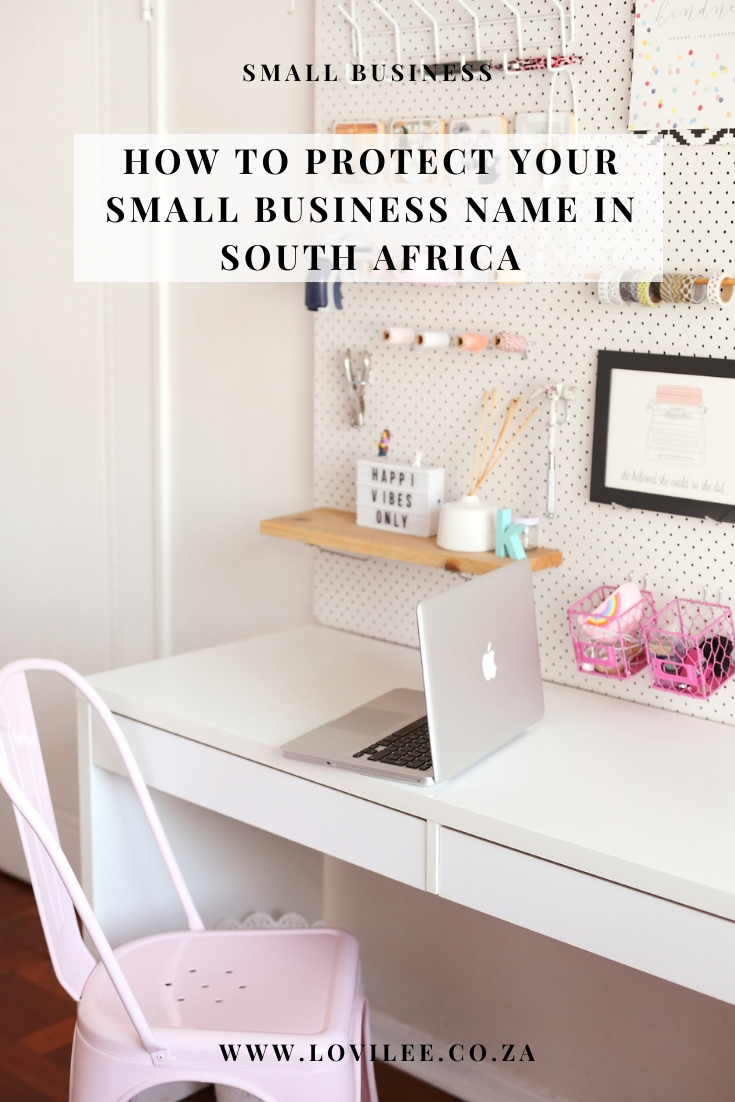Whether you are a blogger or an entrepreneur, seller of products or a service provider, you are essentially a business owner that needs to ensure that you take the proper steps to protect the name of your business. Note: I am NOT AN EXPERT on small business’ all the information below is what I had to follow myself, in order to protect my own business / blog ‘LOVILEE’.

WHO IS CIPC?
The Companies & Intellectual Property Commission (CIPC) is the regulatory body in South Africa which is responsible for managing the Registration of Companies, Co-operatives and Intellectual Property Rights (trademarks, patents, designs and copyright) and maintenance thereof. They have a wealth of information on their website, as well as a very useful Step-by-Step guide section that covers all of the possible legal questions you might have about starting and managing a business in South Africa. For more information visit www.cipc.co.za.
I HAVE DECIDED ON A BUSINESS NAME, BUT WHAT NOW?
Generally, business name may comprise of different languages and symbols. However, names are not allowed to infringe existing names or trademarks and may not be offensive or incite violence. For each type of business (public, private or state-0wned), the name will end with a different expression (for instance, a private company ends with “(Pty) Ltd”).
The Consumer Protection Act, 2008 will, in future (on a date to be determined by the Minister), make it mandatory to register your business or trading name, if such name is different from your own name or that of your company. For example, if I was trading as a Sole Proprietor under Lovilee but because I did not have the entity registered, I would have to revert to using Karen Kelly as my ‘business’ name’. (If you are unsure about what type of business you need, you can find out information on the CPIC website or call in a third party to assist. Note, each business type has its own requirements, obligations and taxation regime. After investigation and consulting with people that know way more than I did, I decided to go the Sole Proprietor route and pay TAX according to my own requirements).
Regardless of what business route you decide to take, the below steps are a good start.
Recommended Steps
- Register the defensive business name this will ensure that no other person can trade using the same name. Prior to registering a business name, CIPC will check the name against the business names already registered to make sure that it is available for use.
- If you decide that you want to have a business website (or email address) you need to check if the name is available and then register the relevant domain. I enjoy using co.za. (note that I might earn a small commission if you use this link).
- If you have a unique name e.g. LOVILEE that is not a standard language word you might want to trademark the actual name so that others cannot make use of the spelling. If I ran a blog called ‘LOVELY’ I would not be possible to trademark the name as it would be impossible for others not to use the word as it is a standard English word.
Note that Trademark, Domain and Business name registrations are totally separate from each other. So make sure you protect yourself by making sure that you at least complete step 1 and 2 above.
WHAT IS A DEFENSIVE BUSINESS NAME REGISTRATION?
A Defensive Name is a business name that is reserved for your use, for “trading as” or future use, for a period of two years. You must renew the name every 2 years if you want to keep on using it. For instance, if I run my business as LOVILEE and did not do this defensive name / business / trade registration, anyone can go register LOVILEE as business and I will either have to take legal action or have to change my business name, domain, re-print business cards rename Facebook, Twitter and Instagram accounts etc. (in other words an ADMIN nightmare).
HOW TO REGISTER A BUSINESS NAME IN SOUTH AFRICA?
You can register your business name directly via the CIPC website. They have a great step by step video tutorial that you can have a look at below. I made use of www.businessnamesregistry.co.za to handle the process on my behalf. They assist you with a Business, Trade or Defensive name registration at a once-off fee.
HOW TO RENEW A DEFENSIVE BUSINESS NAME REGISTRATION?
You need to apply to renew your defensive business name at least two months before the expiry date via the CPIC website or via www.renewname.co.za. Note, that if the name passes the expiry date and it is not renewed, you will need to apply to register the business’ name from scratch again. There is also a fee involved in this process and a risk is that the name may no longer be available.
HOW TO REGISTER A TRADEMARK IN SOUTH AFRICA?
When I started lovilee about 9 years ago, I started investigating trademarking the name ‘LOVILEE’. There are off-course a whole host of different Trademarks available. Some only applies to a name (as in the case of LOVILEE spelling), others to a product design or event, to the font that you use for a logo e.g. the Coca-Cola name and look of the logo. I again used a third-party service provider to do the Trademark registration for me as I did not have a clue where to start and received a 10-year registration for the trademark. My Trademark is only applicable in South Africa, if you want a name to be registered Internationally there is a lot more admin (and cost) involved.
The CIPC has some information that just pertains to Trademarks that you will find useful if you are considering any form of Trademark registration.

WHAT TO DO IF YOU HAVE A REGISTERED BUSINESS NAME AND SOMEONE STARTS TO TRADE / USE THE EXACT SAME NAME?
There are different ways to handle this scenario should you be faced with it. The best way, in my opinion, is always to start by conversing in a friendly manner. In most cases the person using the same business name or name that you trademark is blissfully unaware of the fact that you actually registered the name or trademark. they might not even be aware that you needed to do this in order to start using the name. If you write a nice email or get in contact with them in via private messages on social they might be willing to change their name or alter it in a way that it is different than yours without any other steps having to be taken. If you start off a conversation in a threatening tone or start posting on their social timelines you will most probably start a war that could have been avoided. This might also, in turn, hurt your brand image – the key is to treat others in the same way that you would like to be treated if you were the person on the receiving end.
That said, if you have tried the amicable approach, without success, then it would be best to get legal assistance, especially if you have invested in a brand. Johann Schalkwyk, a commercial attorney, notes that you may have legal recourse if someone infringes your business name and, depending on the facts, you could lodge a compliant with the Companies Tribunal. It is, however, recommended that you have, at least, taken some pro-active steps (like the steps mentioned above) to protect your business & brand, like registering your business name and IP.
I hope that these basic tips will help you in some way. If you have any questions you can direct them to the CPIC that will definitely be able to give you sound advice.
Next Read that might come in handy (and that I know much more about) – How to start your own blog or website.
All images by Hello Love Photography.
Let's get social
Instagram: @lovilee_zaTwitter: @lovilee_za
Facebook: @lovileeblog
or subscribe to never miss out on any new articles in this link.




2 Comments
This is a great post, thank you!
I want to submit a defensive name to CIPC but I’m not sure about the proof of direct and material interest they require. I can find no clear information on the web! Your post was the closest! And CIPC has vague wording. Can you help? I know you said you used a company but perhaps you can recall what proof you had to provide? Anyway, if not, that’s ok. Just taking a chance!
Thanks again for the lovely post!
Hello Tanya,
Sjo, I unfortuanately have no idea. I used http://www.businessnamesregistry.co.za and their email address is [email protected]